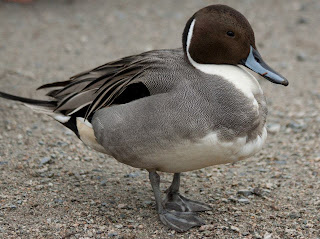Another unexpected delight from our recent trip up to Boundary Bay Regional Park in Delta, BC, was our very first Short-Eared Owl sighting.
While our camera is pretty good, it's nothing like the amazing 500+ mm lenses many birding photographers use. We can only zoom to 150 mm, so this bird is actually pretty close to us and still a bit blurry. We were admiring him from afar when he took an interest to something in our area.
You may wonder what time of day we went birding at to see such an active owl. This was taken around 11 am. The
Short-Eared Owl can actually be diurnal, making one of the few sometimes daytime owls. We were delighted to get a chance to see an owl actively hunting.
I want to give a shout out to our fellow birders for helping us see this owl. We were in touch with the
tweeters (pre-twitter) community for advice prior to our trip north and I received an email alerting us to the presence of the Short-Ear while we were driving up. I kept my ear open and struck up a conversation with two more experienced birders who were looking for it and this lead to our successful sighting. I am really thankful to have such a good birding community in the Pacific Northwest.
Another interesting fun fact is that these birds are believed to only be day-hunters when voles are extremely active, which might be why he's hanging out with the Snowy Owls. No one has come up with a concrete theory as to why the snowies came south this year, but food source is the obvious choice, plus I like to point out that
Alaska is having a particularly bad winter. I like to head south when the weather sucks, so why wouldn't the Snowy Owls? They don't even need a passport.
Except in Hawaii.
Short-Eared Owl landing on a scouting spot.




























